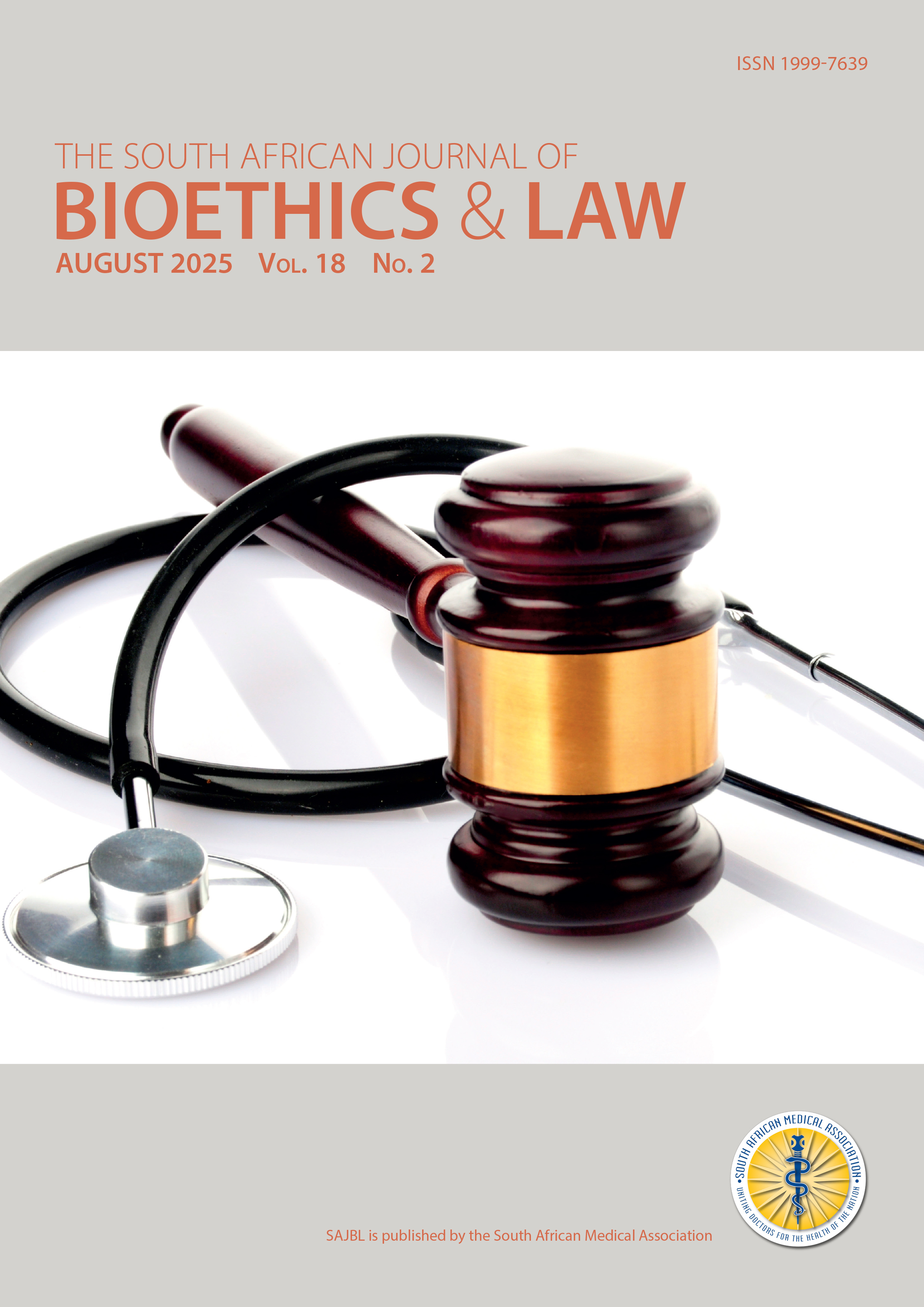Ensuring public safety and professional integrity: The vital role of healthcare regulators in South Africa
Main Article Content
Abstract
Healthcare regulation is often misunderstood as burdensome, yet it serves a critical function in safeguarding public health and maintaining professional integrity. The first objective of the present article is to explore the essential role of healthcare regulators in South Africa, with a focus on the Health Professions Council of South Africa (HPCSA). Established under the Health Professions Act 56 of 1974, the HPCSA oversees a broad mandate encompassing the registration, licensing and regulation of healthcare practitioners to ensure ethical and competent service delivery. The Council also establishes practice standards, evaluates educational programmes, promotes continuous professional development, and investigates complaints to ensure upholding public trust and safety.
The second objective of the article is to clarify common misconceptions about healthcare regulation, including concerns about fee structures and registration suspension policies. It also aims to highlight the benefits that regulation offers healthcare professionals, such as enhanced credibility, legal compliance, and improved employment opportunities. The HPCSA’s dual mandate to protect the public and guide professions is examined through its legislative framework and relevant case law such as HPCSA v Grieve. As healthcare evolves, regulators such as the HPCSA must adapt to emerging challenges, ensuring the sector remains safe, ethical and effective. The third objective is to underscore the indispensable value of regulation in preserving both public safety and the integrity of the healthcare profession.
Article Details
Issue
Section

This work is licensed under a Creative Commons Attribution-NonCommercial 4.0 International License.
The SAJBL is published under an Attribution-Non Commercial International Creative Commons Attribution (CC-BY-NC 4.0) License. Under this license, authors agree to make articles available to users, without permission or fees, for any lawful, non-commercial purpose. Users may read, copy, or re-use published content as long as the author and original place of publication are properly cited.
Exceptions to this license model is allowed for UKRI and research funded by organisations requiring that research be published open-access without embargo, under a CC-BY licence. As per the journals archiving policy, authors are permitted to self-archive the author-accepted manuscript (AAM) in a repository.
How to Cite
References
1. Browne J, Bullock A, Poletti C, Cserző D. Recent research into healthcare professions regulation: A rapid evidence assessment. BMC Health Serv Res 2021;21:934. https://doi.org/10.1186/s12913-021-06946-8
2. Gutacker N, Bloor K, Bojke C, Archer J, Walshe K. Does regulation increase the rate at which doctors leave practice? Analysis of routine hospital data in the English NHS following the introduction of medical revalidation. BMC Medicine 2019;17:33. https://doi.org/10.1186/s12916-019-1270-4
3. South Africa. Health Professions Act No. 56 of 1974.https://www.gov.za/sites/ default/files/gcis_document/201505/act-56-1974.pdf (accessed 16 January 2025). 4. South African government. Nursing Act No. 33 of 2005. https://www.gov.za/sites/
default/files/gcis_document/201409/a33-050.pdf (accessed 16 January 2025).
5. South African government. Pharmacy Act No. 53 of 1974. https://pharmcouncil. co.za/Media/Default/Pharmacy%20Act/Pharmacy%20Act%2053%20of%20
1974.pdf (accessed 16 January 2025).
6. South Africa. Medical Schemes Act No. 131 of 1998. https://www.gov.za/
documents/medical-schemes-act (accessed 16 January 2025).
7. National Health Act: Procedural regulations pertaining to the functioning of office of Health Standards Compliance and handling of complaints by the Ombud. https://www.gov.za/sites/default/files/gcis_document/201610/40350gon1275.
pdf (accessed 16 January 2025).
8. South African government. Medicines And Related Substances Act, 1965 (Act No.
101 Of 1965) as amended [Internet] (accessed 16 January 2025). https://www. sahpra.org.za/document/medicines-and-related-substances-act-1965-act-no- 101-of-1965-as-amended/
9. South Africa. Veterinary and Para-Veterinary Professions Act No. 19 of 1982
https://savc.org.za/wp-content/uploads/2021/05/022_Integrated-Act-19-of-
1982-Updated-22-Feb-2019.pdf (accessed 16 January 2025).
10. McQuoid-Mason D, Khumalo TL. When a device that later disintegrates is fitted to a patient during surgery, who is responsible for the consequences? What health professionals and hospitals need to know. S Afr J Bioethics Law 2024;17(3):e2563.
https://doi.org/10.7196/SAJBL.2024.v17i3.2563
11. Torralba KMD, Katz JD. Quality of medical care begins with quality of medical education. Clin Rheumatol 2020;39(3):617-618. https://doi.org/10.1007/s10067- 019-04902-w
12. Council on Higher Education. Programme Accreditation [Internet]. 2025. https:// www.che.ac.za/focus-areas/programme-accreditation
13. Andersson H, Svensson A, Frank C, Rantala A, Holmberg M, Bremer A. Ethics education to support ethical competence learning in healthcare: An integrative systematic review. BMC Medical Ethics 2022;23(1):29. https://doi.org/10.1186/ s12910-022-00766-z
14. The Supreme Court of Appeal of South Africa media summary of judgement delivered [Internet]. Bloemfontein: Supreme Court of Appeal of South Africa; 2021 https://www.supremecourtofappeal.org.za/images/judgment_2021/sca2021- 06ms.pdf (accessed 16 January 2025).
15. Kwinda M, Labuschaigne M, Slabbert M. Disciplinary proceedings against healthcare practitioners facing criminal charges: The role of the Health Professions Council of South Africa. S Afr J Bioethics Law 2022;15(2):44-47. https://doi.org/10.7196/SAJBL.2022.v15i2.804
16. The Supreme Court of Appeal of South Africa Judgement [Internet]. Bloemfontein: The Supreme Court of Appeal of South Africa; 2021 (accessed 16 January 2025). https://www.saflii.org/za/cases/ZASCA/2021/6.pdf
17. Luo Z, Junfeng M, Abbasi BN, Zilong L. Institutional structure and governance capability in universities: An empirical study from the perspectives of time, space, and quantity dimensions. Humanit Soc Sci Commun 2024;11(1):1-17. https://doi. org/10.1057/s41599-024-03558-5
18. Schulmann K, Bruen C, Parker S, Siersbaek R, Conghail LM, Burke S. The role of governance in shaping health system reform: A case study of the design and implementation of new health regions in Ireland, 2018-2023. BMC Health Services Res 2024;24(1):578. https://doi.org/10.1186/s12913-024-11048-2
